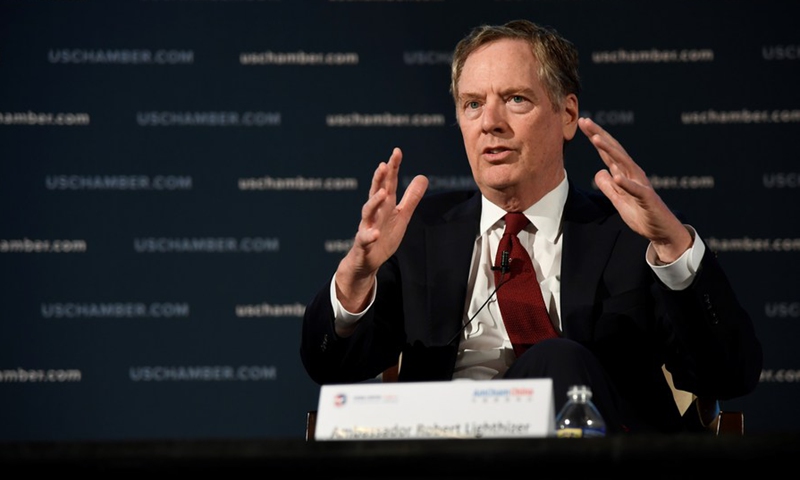Tariff war didn't work on China under Trump, won't work under Biden
By Wang Cong Source: Global Times Published: 2020/12/17 22:08:40

US Trade Representative (USTR) Robert Lighthizer speaks at an event hosted by the U.S. Chamber of Commerce in Washington D.C., the United States, on May 1, 2018. (Xinhua/Yang Chenglin)
In a recent interview with Reuters, outgoing US Trade Representative Robert Lighthizer sought to defend the US' multi-year trade war with China and even suggested that the incoming Joe Biden administration should keep tariffs on Chinese goods and "hold their feet to the fire" on the China-US phase one trade agreement.
It is no surprise that Lighthizer, who oversaw President Donald Trump's bruising trade war with China over the past four years and took a central role in the exhaustive negotiations for the trade agreement, wants to justify what Biden has criticized as a "damaging," "reckless" and "disastrous" tariff war, as the approach is facing increasing legal challenges and public scrutiny in the US.
However, the US trade representative's self-defense lacks any concrete support. The reality is that while the trade war may be politically satisfactory to certain radical anti-China circles in US society, the tariff war did not work in derailing China's economic rise, as the US intended; nor did it bring any extra leverage or benefits to the US economy. What it did instead was hurt US businesses and consumers, as they are forced by their own government to pay extra on Chinese goods.
Numbers don't lie. Since the US slapped punitive tariffs on a total of $370 billion worth of Chinese products starting in July 2018, they have cost US importers $71.6 billion, Reuters reported, citing US customs data. While Trump has billed those as extra income for the US Treasury, they are paid by US businesses, which, many economists have pointed out, will pass the cost on to consumers.
It is precisely for that reason that more than 3,000 US businesses, including big corporations like Tesla and Ford Motors, have filed suits against the US government over what they call "unlawful" tariffs. Some claimed that the "unbounded and unlimited trade war" has affected billions of dollars worth of goods imported from China. It is important to point out that a panel of the WTO has already ruled that the US tariffs were in violation of international trade rules.
Strikingly, the US businesses specifically named Lighthizer and the Customs and Border Protection agency in their lawsuits. While Lighthizer has made clear his disdain for the WTO, he should be aware of the widespread US domestic opposition to the tariffs and potential consequences from the lawsuits. Therefore, by urging the Biden administration to keep the tariffs, Lighthizer appears to be passing the hot potato to the new US administration.
Lighthizer also seemed to know the ineffectiveness of the tariffs, as he, in defending the approach, stressed the political optics of keeping the tariffs, saying that "if you see the tariffs dissipating that's a signal that we're not serious about understanding that China is a strategic adversary."
That "understanding" appears to have formed a twisted logic within US political circles, where looking "tough" on China is the most important thing, and the cost and damage to the US economy or other economies don't matter. If Biden gives in to pressure to continue that approach, it would do no good for anyone - not China, not the US and certainly not the world.
Biden, who has been in US politics for decades, must be aware of that. But so far, he appears to be heading in the wrong direction, as he stated in a recent interview that he would not make an "immediate move" on the tariffs. He also suggested he would form a unified front with allies against China.
In China, officials have been consistent in saying that they are open to constructive dialogue and win-win cooperation with the US. It has continued to carry out the phase one agreement by purchasing what the US Trade Representative's office and the US Department of Agriculture call a "record" number of US farm goods, despite the COVID-19 pandemic.
There is no indication whatsoever that China will stop implementing the deal once Biden takes over the White House, so Lighthizer's suggestion of "[holding] their feet to the fire on Phase 1" is not only unnecessary but could also be counterproductive to further implementation of the hard-won agreement.
If there is one thing we can learn about China from the multi-year trade war, it is this: Beijing would never give in to so-called maximum pressure and brinkmanship, and it has the confidence and capability to respond to any potential aggression from the US.
Despite the trade war, China's economy remained among the world's fastest-growing and is expected to be the only G20 economy to expand this year; China's trade has continued to roar amid the pandemic, with the surplus reaching a record high of $75.43 billion in November, latest customs data showed. China has only expanded its global markets, by continuing the Belt and Road Initiative, signing the world's biggest trade pact - the RCEP - and pushing for more agreements, including a sweeping investment deal with the EU.
Additionally, China has maintained its lead in certain high-tech areas, including 5G and artificial intelligence, despite a US crackdown.
The bottom line: Wielding the tariff stick did not work on China under Trump, and it will not work under Biden. So Mr. President-elect, drop the tariffs and start constructive dialogue with China that will bring concrete benefits to the American people who voted for you.
The author is a reporter with the Global Times.
RELATED ARTICLES:
Posted in: GT VOICE